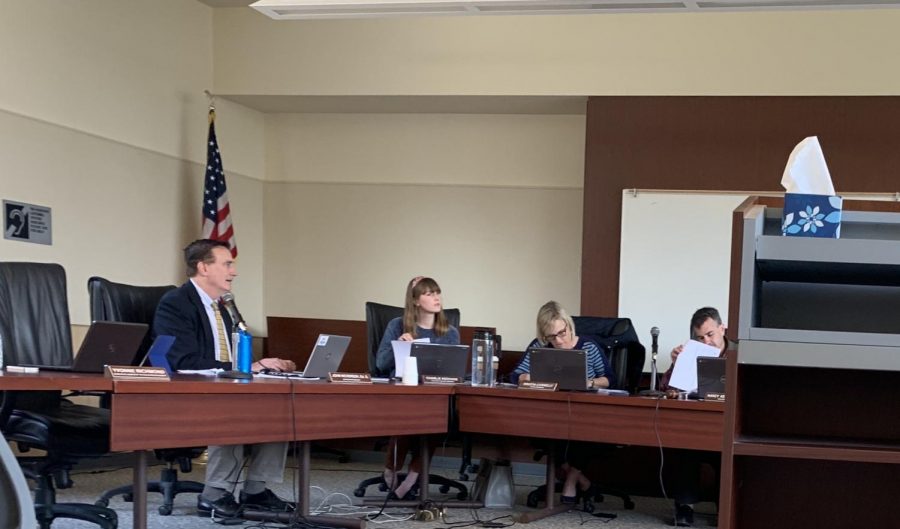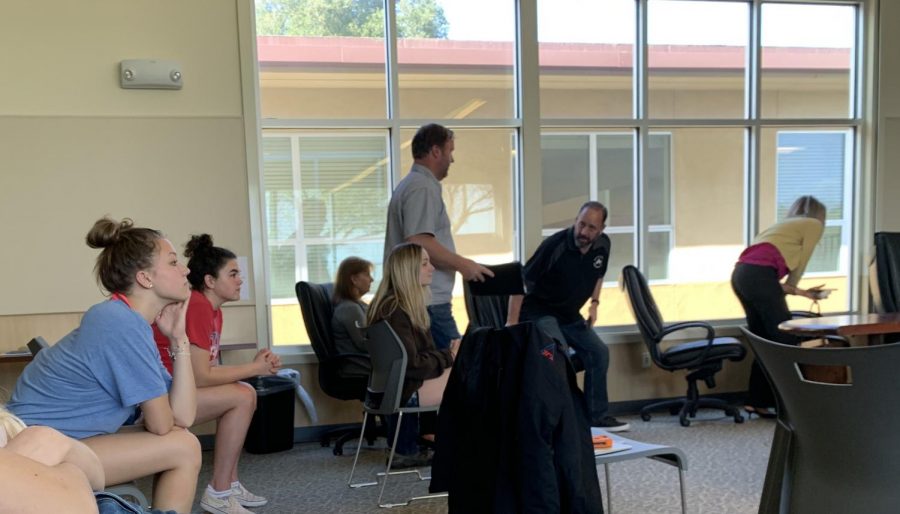Governing Board Votes for School Closures
March 16, 2020
The Acalanes Union High School District (AUHSD) governing board announced the closure of all district schools from March 16 until April 3 following its March 13 emergency meeting due to the COVID-19 pandemic.
In the meeting, the governing board voted 4-1 to close all AUHSD schools until the end of spring break.
Although schools will be closed, students will be required to complete their schoolwork online for the 2 weeks leading up to spring break.
Prior to this decision, the district received hundreds of emails from concerned parents and students pushing for schools to close after the cancelation of nearly all extracurricular activities, including the musical, several major field trips, and the March 14 SAT exam.
Junior Laura Studebaker, who wondered why the district had canceled so many extra-curricular activities, but not classroom instruction, attended the meeting to “hear the full rundown of why everything got canceled.”
“If we could be in a classroom, why couldn’t we be in on a field?” said Studebaker.
While other California districts, including San Francisco Unified and Los Angeles Unified, had already closed down several days before the meeting, Superintendent Dr. John Nickerson said that, based on county recommendations, a closure prior to March 16 was “too early.”
Board member Christopher Severson, the only member to oppose the motion, thought that it would be more reasonable to wait until health organizations backed the closing of schools. Contra Costa Health Services (CCHS) has advised that closing schools for a 3-4 week time period has not demonstrated its ability to contain the virus.
According to Severson, closing schools in the district would be premature as “the numbers will look worse and worse.” Once closed, Severson has “near-zero expectation,” that AUHSD schools will reopen before the end of the school year.
Having had 3 children who have experienced online instruction, Severson feels that the model cannot truly be a replacement for hands-on experience in the classroom. “It’s very difficult to maintain, and learning will be severely impacted,” said Severson.
Yet, the board elected to move forward with the school year without face-to-face instruction. Administrators and teachers are now working on developing curriculum for students to access online for the next few weeks.
Another concern that may have factored into the board’s decision is that 38% of teachers in the district are over the age of 50. Older people are more likely to suffer serious illness and even death as a result of contracting the virus.
Furthermore, 70% of substitute teachers in the district are also over the age of 50.
1 benefit of this 3-week school closure is that custodians will have the “opportunity” to “thoroughly clean,” the schools, according to Superintendent of Administrative Services Amy McNamara.
The district conducted a survey among students in order to assess student technology needs. It has also discussed a “grab n’ go” protocol for providing free lunches to students who qualify for them.
Studebaker understands the health and safety risks of attending school now, but she has concerns about adjusting to an online system. “Hopefully, the 2 weeks go well and things get better so we can come back soon,” she said.
Nickerson emphasized that students who ignore the self-isolation recommendations will “defeat the purpose” of the school closure. The superintendent noted the importance of social distancing in order to curtail the spreading of COVID-19.
The district also made it clear that the state-mandated California Assessment of Student Performance and Progress (CAASPP) testing that was scheduled from March 16 through March 20 will be made up at a later date.
However, whether or not AP exams will be conducted in May remains uncertain. The district has little influence over the College Board’s decisions.
While the governing board elected to temporarily close its campuses, it did not make any determination regarding junior prom, senior ball, and graduation. “Senior activities, final exams, graduation, all of those things, [are] important parts of the senior high school experience. It would be devastating to lose that for them,” said Nickerson.



